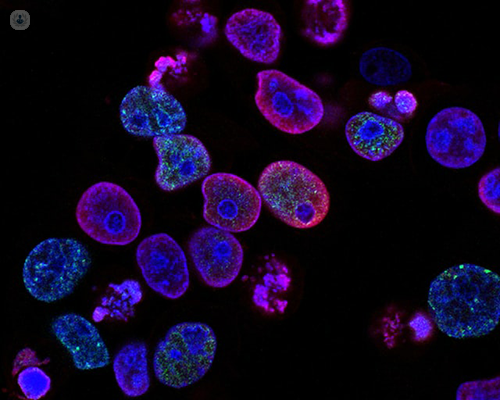Colorectal cancer: Expert insight from a leading specialist
Autore:Highly respected consultant colorectal surgeon Professor Richard Cohen, who is chief of surgery and chair of digestive disease and surgery at London’s esteemed Cleveland Clinic, shares his expert insight on colorectal cancer in this informative article. The revered specialist details the first warning signs of the disease and its progression and also sheds light on what is known about the causes of colorectal cancer.

What are the first warning signs of colorectal cancer?
Colorectal cancer can present in many ways or indeed, it can be hidden and only be found incidentally on a screening test.
The way it presents clinically is commonly with rectal bleeding (blood coming from the back passage). Normally, it’s not fresh blood and is often dark in colour and may also present with mucus or slime from the back passage.
Another common presentation is a change in bowel habit, particularly a change towards alternating constipation and diarrhoea. On the other hand, a new tendency towards constipation is not usually associated with an underlying sinister pathology. Unfortunately, this can be the case if the change is towards diarrhoea and particularly so if it is both diarrhoea and constipation.
Finally, in extreme cases, colorectal cancer can present as a palpable lump in the abdomen which the patient notices themselves.
What are the causes of colorectal cancer?
That’s a very interesting question. In fact, we don’t know the exact causes of colorectal cancer. Particularly in the western world, we think that colorectal cancer develops from something known as a polyp, which is a wart like lesion in in the lining of the colon. Initially, these polyps are benign but can become cancerous over a period of many years.
We have picked up these polyps in various stages of transformation and through observation, we are able to see that in some larger polyps, a part of the lesion has turned into cancer. For this reason, removing polyps at an early stage prevents them from becoming cancerous. This highlights the importance of undergoing colonoscopy when appropriate and having polyps removed in preventing patients from developing cancer.
Additionally, there are other colorectal cancers which arise quickly and out of the blue. Unfortunately, we don’t currently understand why this occurs.
Our knowledge of the causes of colorectal cancer is growing but it is still not very advanced. We do know, for instance, that certain foods like burnt red meat have a small but definite tendency to be implicated in the cause of cancer and there are likely some additional dietary contributors.
We are also aware of a genetic predisposition within some families for colorectal cancer. Some people can inherit a certain gene type from their family, with which the instance of colorectal cancer is very high. This can help us to take action before cancer develops in some cases, as we can carefully check family members when this gene type is found to be present.
Does colorectal cancer spread to other parts of the body quickly?
Colorectal cancer, like all types of cancer, can spread to other parts of the body. Normally, colorectal cancer initially spreads to the lymph glands as they sit next to the blood supply of the bowel. From the lymph glands, the cancer can continue to spread to the liver, then to the lung and occasionally elsewhere in the body.
In almost all patients, should the cancer spread, it does so primarily in the lymph glands before reaching any other organs. If the cancer is caught early and before it spreads, it is much easier to treat.
Although colorectal cancer can spread, we understand that this occurs over quite a significant period of time – across many months or years. Therefore, it is important to understand that should you have colorectal cancer which has not spread, your specialists will form a measured treatment plan. Acting with great urgency will not affect spreading of colorectal cancer as if this occurs, it does so over a protracted period of time - across months and years rather than hours and days.
Can colorectal cancer be fatal?
Like all cancers, colorectal cancer can be fatal but ideally, we pick the cancer up at a stage when it can be treated and cured or we are able to manage the disease.
These days, many cancers are no longer fatal but rather they become like a chronic disease which can be treated and managed. Much like with diabetes, where patients receive insulin treatment, patients with cancer undergo chemotherapy and radiotherapy. These days, we are able to keep significantly more patients alive, even when they have advanced cancer.
The best thing is to always try to get early intervention so any issues can be picked up either before they become cancerous, such as the polyps that I have described, or at a very early stage so that treatment can be more effective and hopefully curative.
If you are seeking treatment for colorectal cancer or are concerned about a family history of the disease, you can schedule an appointment with Professor Cohen by visiting his Top Doctors profile.


